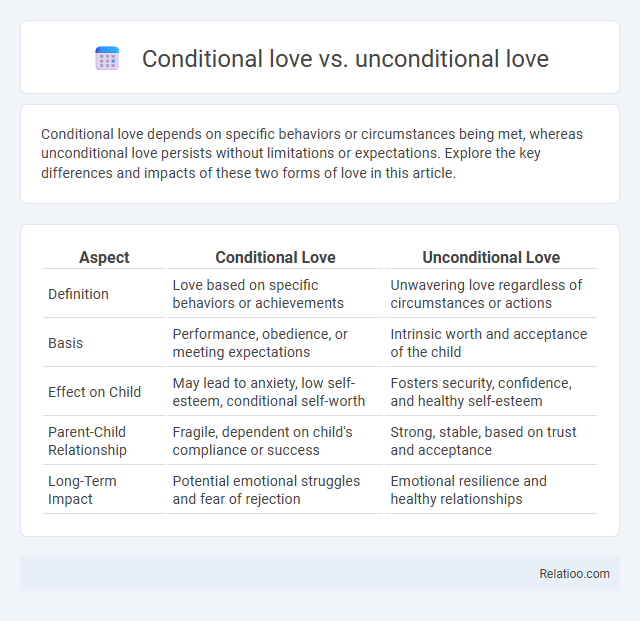Conditional love depends on specific behaviors or circumstances being met, whereas unconditional love persists without limitations or expectations. Explore the key differences and impacts of these two forms of love in this article.
Table of Comparison
| Aspect | Conditional Love | Unconditional Love |
|---|---|---|
| Definition | Love based on specific behaviors or achievements | Unwavering love regardless of circumstances or actions |
| Basis | Performance, obedience, or meeting expectations | Intrinsic worth and acceptance of the child |
| Effect on Child | May lead to anxiety, low self-esteem, conditional self-worth | Fosters security, confidence, and healthy self-esteem |
| Parent-Child Relationship | Fragile, dependent on child's compliance or success | Strong, stable, based on trust and acceptance |
| Long-Term Impact | Potential emotional struggles and fear of rejection | Emotional resilience and healthy relationships |
Understanding Conditional Love
Conditional love depends on specific behaviors or achievements, often tied to expectations and performance in relationships. Understanding conditional love reveals its inherent limitations, where affection and acceptance fluctuate based on meeting certain conditions. Unlike unconditional love, which persists regardless of circumstances, conditional love can lead to insecurity and anxiety as it requires continuous validation.
Defining Unconditional Love
Unconditional love is a profound, unwavering affection that persists regardless of circumstances, actions, or outcomes, unlike conditional love which depends on specific behaviors or achievements. Your relationships thrive when rooted in unconditional love, as it fosters acceptance, trust, and emotional security without requiring reciprocation or conditions. Understanding this distinction is vital for cultivating deeper connections and genuine compassion.
Key Differences Between Conditional and Unconditional Love
Conditional love depends on specific behaviors, achievements, or circumstances, making affection and acceptance contingent upon meeting certain criteria. Unconditional love offers unwavering support and acceptance regardless of actions, emphasizing genuine care without expectations or limitations. Key differences include the presence of prerequisites in conditional love versus the boundless nature of unconditional love, which fosters security and emotional freedom.
Psychological Roots of Love Conditions
Conditional love often stems from psychological needs tied to approval, validation, and fear of abandonment, where affection is dependent on meeting specific expectations. Unconditional love originates from emotional security and self-acceptance, allowing affection to remain stable regardless of circumstances or behavior. The psychological roots highlight attachment styles formed in early childhood, with conditional love linked to anxious or avoidant attachments and unconditional love associated with secure attachment patterns.
Impacts of Conditional Love on Relationships
Conditional love often creates insecurity and anxiety in relationships, as partners may feel they must constantly meet specific expectations to be valued. This form of love can undermine trust and emotional safety, leading to a cycle of fear and dissatisfaction. Unlike unconditional love, conditional love restricts genuine intimacy and personal growth within the partnership.
Unconditional Love and Emotional Well-being
Unconditional love fosters emotional well-being by providing a stable foundation of acceptance and support that nurtures your self-esteem and resilience. Unlike conditional love, which depends on specific behaviors or achievements, unconditional love offers consistent emotional security, reducing anxiety and promoting mental health. This form of love encourages authentic self-expression and deepens interpersonal connections, essential for overall psychological well-being.
Signs You’re Experiencing Conditional Love
Experiencing conditional love often involves feeling judged or accepted only when meeting specific expectations or behaviors, creating insecurity and anxiety in the relationship. Signs include frequent ultimatums, love being withdrawn as punishment, and a lack of emotional consistency, reflecting a transactional dynamic rather than genuine care. Unlike unconditional love, which offers unwavering acceptance regardless of circumstances, conditional love imposes limits and compliance as prerequisites for affection.
How to Cultivate Unconditional Love
Cultivating unconditional love requires embracing empathy, patience, and acceptance without expecting anything in return. Focus on valuing your relationships by recognizing your partner's flaws and strengths equally, fostering trust and emotional safety. Your commitment to consistent kindness and open communication transforms conditional bonds into deeper, unconditional connections.
Conditional vs. Unconditional Love in Parenting
Conditional love in parenting depends on a child's behavior or achievements, creating an environment where affection feels earned rather than guaranteed. Unconditional love provides consistent emotional support regardless of success or failure, promoting a secure and confident sense of self in children. Studies in developmental psychology emphasize that unconditional love fosters resilience and positive mental health, while conditional love often links to anxiety and lower self-esteem.
Choosing the Healthiest Path: Love Without Limits
Choosing the healthiest path in love means embracing unconditional love, which frees you from the constraints of expectations and fosters genuine connection. Unlike conditional love, which hinges on specific behaviors or achievements, unconditional love offers stability and acceptance regardless of circumstances. Your emotional well-being thrives when love is given without limits, creating a foundation for trust and lasting intimacy.

Infographic: Conditional love vs Unconditional love
 relatioo.com
relatioo.com